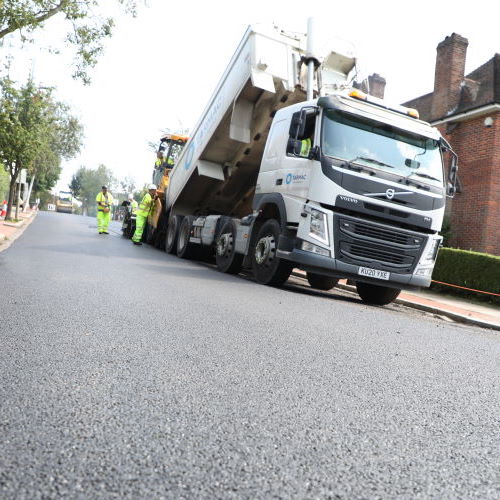RUBBER MODIFIED ASPHALT
Sustainable road surfacing using Rubber Modified Asphalt with secondary steel slag aggregate
Hill Top, London Borough of Barnet

Client
LONDON BOROUGH OF BARNET
Contractor
TKJV/ RINEY
Location type
HILL TOP, BARNET
Completion
AUGUST 2021
The challenge
This wide, tree lined street in the London Borough of Barnet, required a new surface course. There is a bus route along the entire length, and it is subject to on street parking by local residents and parents whose children attend the local infant and junior school. The client required an asphalt material that would deliver long lasting durability but were also looking for a more sustainable and lower carbon solution to help meet their climate change commitments. The new surface course would also need to be installed with minimal disruption to residents and road users. After discussions held during a visit to Tarmac’s nearby Harper Lane asphalt plant between the client and the term maintenance contractor Tarmac Kier JV and Tarmac’s Technical Product
Support Manager, Tarmac’s new Rubber Modified Asphalt was selected.
Our solution
Tarmac’s Rubber Modified SMA incorporates recycled rubber from end-of life tyres and uses warm mix asphalt technology to achieve a lower carbon footprint, typically 8% lower than the equivalent conventional SMA. The use of recycled rubber crumb in the mix helps to avoid export of waste car tyres, incorporating approximately 500 tyres per kilometre of road. The chosen surface would use 35mm of 10mm Rubber Modified SMA 40/60 PSV 60 incorporating steel slag aggregate with rubber crumb added in place of fibres and warm mix binder. Steel slag aggregate, sourced from Tarmac’s facility at the steel works in Port Talbot, South Wales and transferred to London by rail, also helped to reduce embodied carbon, as is classed as zero CO2 rated. Approximately 85% of all the materials in the asphalt were recycled or classed as secondary. As well as reducing carbon emissions, warm mix asphalts also offer proven gains in productivity. Requiring less time to reach trafficking temperatures, they allow more work to be completed within a given operating window. This enables fast, efficient resurfacing with reduced road closures and disruption to traffic.
Results and benefits
Once the old surface was planed out, 240 tonnes of Rubber Modified SMA was supplied and successfully laid by TKJV’s surfacing team in a single shift. Although the program allowed two days for the resurfacing work, using a warm mix asphalt enabled it to be completed in a single day. It also helped to reduce fumes and air pollution on this residential street while work was taking place. The new hard wearing, low texture surface offers excellent deformation and rutting resistance to help withstand the bus traffic and on street parking. It also offered an improved ride quality and visual appearance. As well as reducing disruption to road users, the shorter programme time helped to reduce costs from traffic management charges and reduce risk to highway maintenance teams. The client was impressed with the results of this collaborative working between the term maintenance team and materials supplier which allowed them to benefit from this innovative approach: “This is the future of road resurfacing in Barnet…. Materials technology in road resurfacing has moved forward and really significant improvements in the sustainability of road resurfacing is being achieved with our new joint venture contractor and Tarmac’s material skills” Councillor Peter Zinkin, Barnet London Borough Council
